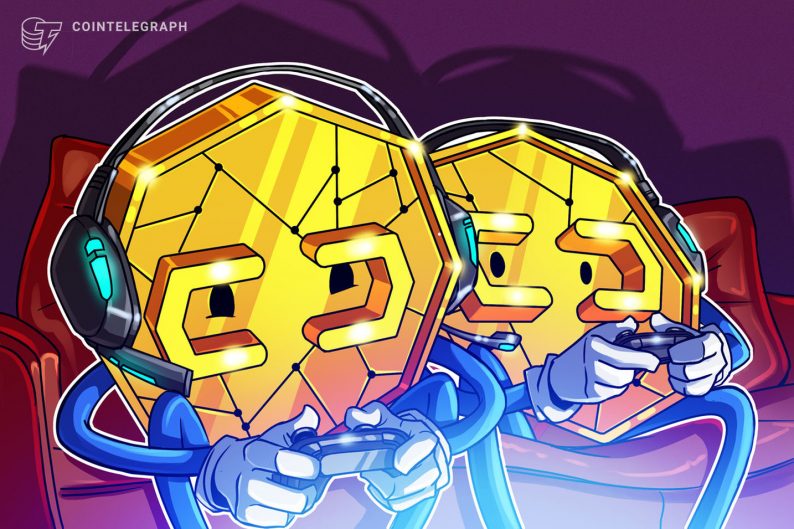Play-to-earn (P2E) blockchain-based games gathered investors’ attention in late 2021, with Axie Infinity leading the pack with over 2 million active users. In P2E games, players are awarded tokens or nonfungible token assets (NFTs) as they progress throughout the game. These digital assets can be sold using marketplaces and cryptocurrency exchanges, generating income in a decentralized manner.
However, there is a large discrepancy between P2E and traditional PC and console gaming experiences. In that sense, crypto games are a couple of decades behind due to the restrictions imposed by blockchain technology.
Yes, most crypto games lack a decent user experience
Although the promise of AAA-level crypto games eventually developing exists, so far, most of the launches gravitate toward digital trading card battles, decentralized finance disguised as role-playing games, and collectibles.
Unsurprisingly, crypto games critics focus on the lack of fun, or a comparable user experience versus the traditional market, as pointed out by analyst Udi Wertheimer.
“ayyy what are you doing tonight let’s play the new crypto game together!”
said no one ever
because crypto games aren’t fun
and also don’t exist
— udiverse (@udiWertheimer) August 2, 2022
According to Anton Link, the CEO of NFT renting and leasing protocol Unitbox Protocol:
Unlike most Web2 titles, fun is not what play-to-earn gamers aim for. Their main goal is to make a profit and be the first to gain new valuable experience that they can effectively use as a guild or cybersports team member to monetize their time.
In terms of adoption, the traditional gaming industry beats the movies and TV entertainment by a large margin. A recent report from Newzoo suggested that the video games market will reach $200 billion in 2022, a 5.4% increase year-over-year. In addition, the report states that the gaming segment entices 3 billion players, far higher than the estimated 320 million crypto users worldwide.
Even if Wertheimer’s remarks are correct, meaning the demand for crypto games will remain sluggish, capturing a mere 0.5% of this segment equates to 16 million users. Moreover, there’s nothing impeding someone from seeking some form of revenue in P2E and, separately, enjoying traditional games on consoles, PCs and mobile apps.
In regards to the potential expanding P2E user base, Anton Link, the Unitbox Protocol CEO said:
I think NFT blockchain games and the GameFi sector will be the key drivers of the industry in the next few years – and will also become a vehicle for the mass transition of new users to the crypto industry through new NFT-based DeFi products.
There’s a considerable difference between collectible NFTs and in-game avatars, armors, weapons, land, and spaceships. Likely the prejudice against P2E games comes from the 67% decline in NFT trading volume from May 2021 to July 2021, according to data from DappRadar. Furthermore, Axie Infinity has been plagued by a massive $600 million Ronin bridge hack on March 29.
DeFi-focused games could generate income for many
There’s plenty of valid criticism for the crypto gaming industry, and forcing users to buy items or tokens sits near the top of this list of complaints. However, one should note that the multiple decentralized finance (DeFi) applications are disguised as games, such as “DeFi Kingdoms,” “Farmers World” and “Sunflower Land.” In these cases, expecting free compensation without any initial investment would be weird.
Despite the challenges in onboarding users and creating sustainable in-game economies with sufficient incentives, Link explained that, “It will only be a matter of time before institutions start lending against NFTs.”
He elaborated with:
Once the institutional lending infrastructure is in place, we expect the demand for NFTs to rise as well, as institutional money can flood into the country due to the additional utility that comes from securing their NFTs.
Maybe, in the near future, players will no longer have to buy digital monsters and spaceships before adventuring in P2E. Even though there’s valid criticism for the crypto gaming industry, a 10x increase in active players to 16 million is not far-fetched. More importantly, this growth and the new models supporting it do not need the same user experience provided by traditional games that don’t require interaction with blockchains.
The views and opinions expressed here are solely those of the author and do not necessarily reflect the views of Cointelegraph. Every investment and trading move involves risk. You should conduct your own research when making a decision.








Leave A Comment